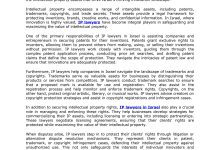Future-Proofing Property Transactions: Lawyers’ Perspectives on Trends
In an era of rapid technological advancements and evolving consumer expectations, the legal profession is not immune to change. The field of property law, in particular, has witnessed significant transformations in recent years. As property transactions become increasingly complex, lawyers are faced with the challenge of future-proofing their practices to meet the demands of the modern real estate market.
The Rise of Digitalization
One of the most prominent trends shaping property transactions is the rise of digitalization. With the advent of online platforms and electronic signatures, the traditional paper-based processes are being replaced by more efficient and streamlined methods. Lawyers are now leveraging technology to automate routine tasks, such as document preparation and contract management, allowing them to focus on more complex legal matters.
For example, platforms like DocuSign have revolutionized the way property transactions are conducted. Lawyers can now securely send and sign documents electronically, eliminating the need for physical meetings and reducing the turnaround time. This not only enhances convenience for clients but also minimizes the risk of errors and delays.
The Importance of Data Security
As property transactions increasingly rely on digital platforms, data security has become a paramount concern for lawyers. With sensitive information being shared and stored online, the risk of cyber threats and data breaches is ever-present. Lawyers must adopt robust security measures to protect their clients’ confidential information and maintain their trust.
Encryption technologies, multi-factor authentication, and secure cloud storage are some of the tools lawyers can employ to safeguard data. Additionally, regular staff training and awareness programs can help mitigate the risk of human error, which often serves as a weak link in the security chain.
Embracing Artificial Intelligence
Artificial intelligence (AI) is another trend that is reshaping property transactions. AI-powered tools can analyze vast amounts of data, identify patterns, and provide valuable insights to lawyers. This technology enables lawyers to make more informed decisions, predict potential risks, and offer tailored advice to their clients.
For instance, AI algorithms can review property contracts and identify potential legal issues or discrepancies. This not only saves time but also reduces the risk of oversight or human error. AI can also assist in due diligence processes by quickly scanning large volumes of documents and extracting relevant information, allowing lawyers to focus on higher-value tasks.
Streamlining Communication and Collaboration
Effective communication and collaboration are crucial in property transactions, where multiple parties are involved. Lawyers are increasingly leveraging technology to streamline these processes and enhance efficiency.
Cloud-based collaboration tools, such as Google Workspace and Microsoft Teams, enable lawyers to collaborate in real-time, share documents securely, and track changes. This eliminates the need for lengthy email chains and ensures that all stakeholders are on the same page.
Furthermore, video conferencing platforms like Zoom have become indispensable in the wake of the COVID-19 pandemic. Lawyers can now conduct virtual meetings with clients, opposing counsel, and other parties involved in the transaction, saving time and reducing travel costs.
The Role of Blockchain Technology
Blockchain technology has the potential to revolutionize property transactions by providing a secure and transparent platform for recording and verifying transactions. By eliminating the need for intermediaries and reducing the risk of fraud, blockchain can streamline the entire process while ensuring trust and accountability.
For example, platforms like Propy leverage blockchain to facilitate cross-border property transactions. The technology enables secure and efficient transfer of property ownership, eliminating the need for complex legal procedures and reducing costs.
Conclusion
The future of property transactions is undeniably intertwined with technology. Lawyers must adapt to the changing landscape and embrace digitalization, data security, artificial intelligence, streamlined communication, and blockchain technology to future-proof their practices.
By leveraging these trends, lawyers can enhance efficiency, reduce costs, and provide better services to their clients. However, it is important to strike a balance between embracing technology and maintaining the human touch that is essential in the legal profession.





